中考英语阅读理解练习(带答案解析及全文翻译)
- 格式:doc
- 大小:232.00 KB
- 文档页数:34
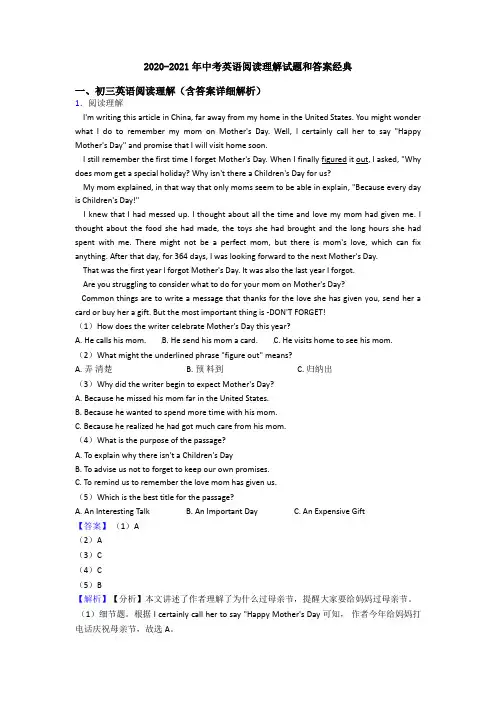
2020-2021年中考英语阅读理解试题和答案经典一、初三英语阅读理解(含答案详细解析)1.阅读理解I'm writing this article in China, far away from my home in the United States. You might wonder what I do to remember my mom on Mother's Day. Well, l certainly call her to say "Happy Mother's Day" and promise that I will visit home soon.I still remember the first time I forget Mother's Day. When I finally figured it out, I asked, "Why does mom get a special holiday? Why isn't there a Children's Day for us?My mom explained, in that way that only moms seem to be able in explain, "Because every day is Children's Day!"I knew that I had messed up. I thought about all the time and love my mom had given me. I thought about the food she had made, the toys she had brought and the long hours she had spent with me. There might not be a perfect mom, but there is mom's love, which can fix anything. After that day, for 364 days, I was looking forward to the next Mother's Day.That was the first year l forgot Mother's Day. It was also the last year I forgot.Are you struggling to consider what to do for your mom on Mother's Day?Common things are to write a message that thanks for the love she has given you, send her a card or buy her a gift. But the most important thing is -DON'T FORGET!(1)How does the writer celebrate Mother's Day this year?A. He calls his mom.B. He send his mom a card.C. He visits home to see his mom.(2)What might the underlined phrase "figure out" means?A. 弄清楚B. 预料到C. 归纳出(3)Why did the writer begin to expect Mother's Day?A. Because he missed his mom far in the United States.B. Because he wanted to spend more time with his mom.C. Because he realized he had got much care from his mom.(4)What is the purpose of the passage?A. To explain why there isn't a Children's DayB. To advise us not to forget to keep our own promises.C. To remind us to remember the love mom has given us.(5)Which is the best title for the passage?A. An Interesting TalkB. An Important DayC. An Expensive Gift【答案】(1)A(2)A(3)C(4)C(5)B【解析】【分析】本文讲述了作者理解了为什么过母亲节,提醒大家要给妈妈过母亲节。
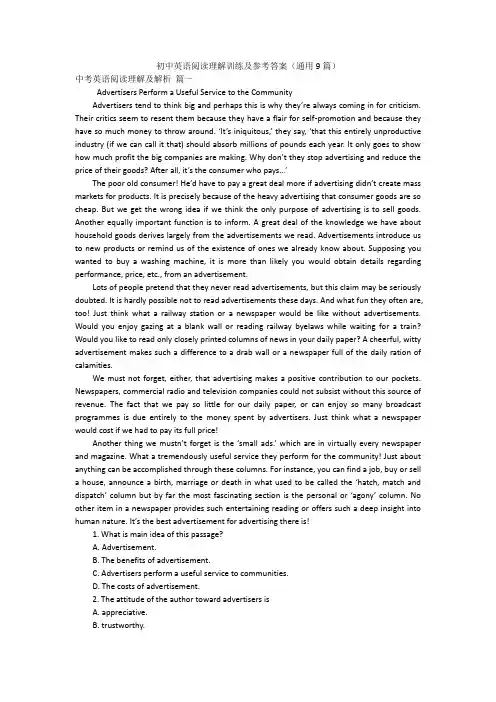
初中英语阅读理解训练及参考答案(通用9篇)中考英语阅读理解及解析篇一Advertisers Perform a Useful Service to the CommunityAdvertisers tend to think big and perhaps this is why they’re always coming in for criticism. Their critics seem to resent them because they have a flair for self-promotion and because they have so much money to throw around. ‘It’s iniquitous,’ they say, ‘that this entirely unproductive industry (if we can call it that) should absorb millions of pounds each year. It only goes to show how much profit the big companies are making. Why don’t they stop advertising and reduce the price of their goods? After all, it’s the consumer who pays…’The poor old consumer! He’d have to pay a great deal more if advertising didn’t create mass markets for products. It is precisely because of the heavy advertising that consumer goods are so cheap. But we get the wrong idea if we think the only purpose of advertising is to sell goods. Another equally important function is to inform. A great deal of the knowledge we have about household goods derives largely from the advertisements we read. Advertisements introduce us to new products or remind us of the existence of ones we already know about. Supposing you wanted to buy a washing machine, it is more than likely you would obtain details regarding performance, price, etc., from an advertisement.Lots of people pretend that they never read advertisements, but this claim may be seriously doubted. It is hardly possible not to read advertisements these days. And what fun they often are, too! Just think what a railway station or a newspaper would be like without advertisements. Would you enjoy gazing at a blank wall or reading railway byelaws while waiting for a train? Would you like to read only closely printed columns of news in your daily paper? A cheerful, witty advertisement makes such a difference to a drab wall or a newspaper full of the daily ration of calamities.We must not forget, either, that advertising makes a positive contribution to our pockets. Newspapers, commercial radio and television companies could not subsist without this source of revenue. The fact that we pay so little for our daily paper, or can enjoy so many broadcast programmes is due entirely to the money spent by advertisers. Just think what a newspaper would cost if we had to pay its full price!Another thing we mustn’t forget is the ‘small ads.’ which are in virtually every newspaper and magazine. What a tremendously useful service they perform for the community! Just about anything can be accomplished through these columns. For instance, you can find a job, buy or sell a house, announce a birth, marriage or death in what used to be called the ‘hatch, match and dispatch’ column but by far the most fascinating section is the personal or ‘agony’ column. No other item in a newspaper provides such entertaining reading or offers such a deep insight into human nature. It’s the best advertisement for advertising there is!1. What is main idea of this passage?A. Advertisement.B. The benefits of advertisement.C. Advertisers perform a useful service to communities.D. The costs of advertisement.2. The attitude of the author toward advertisers isA. appreciative.B. trustworthy.C. critical.D. dissatisfactory.3. Why do the critics criticize advertisers?A. Because advertisers often brag.B. Because critics think advertisement is a “waste of money”。
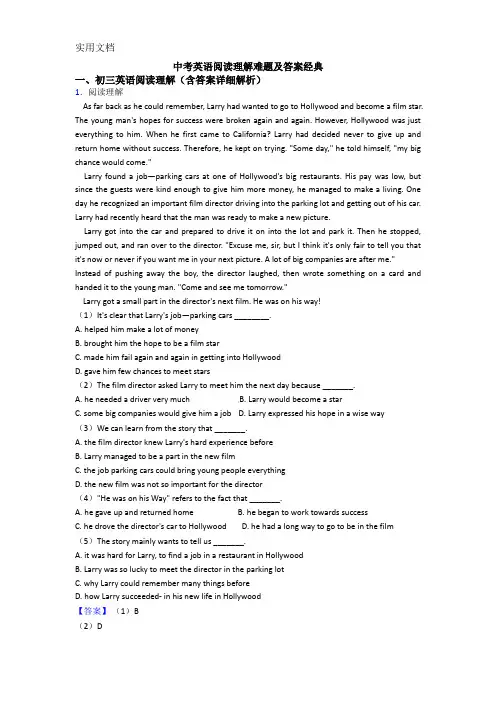
中考英语阅读理解难题及答案经典一、初三英语阅读理解(含答案详细解析)1.阅读理解As far back as he could remember, Larry had wanted to go to Hollywood and become a film star. The young man's hopes for success were broken again and again. However, Hollywood was just everything to him. When he first came to California? Larry had decided never to give up and return home without success. Therefore, he kept on trying. "Some day," he told himself, "my big chance would come."Larry found a job—parking cars at one of Hollywood's big restaurants. His pay was low, but since the guests were kind enough to give him more money, he managed to make a living. One day he recognized an important film director driving into the parking lot and getting out of his car. Larry had recently heard that the man was ready to make a new picture.Larry got into the car and prepared to drive it on into the lot and park it. Then he stopped, jumped out, and ran over to the director. "Excuse me, sir, but I think it's only fair to tell you that it's now or never if you want me in your next picture. A lot of big companies are after me." Instead of pushing away the boy, the director laughed, then wrote something on a card and handed it to the young man. "Come and see me tomorrow."Larry got a small part in the director's next film. He was on his way!(1)It's clear that Larry's job—parking cars ________.A. helped him make a lot of moneyB. brought him the hope to be a film starC. made him fail again and again in getting into HollywoodD. gave him few chances to meet stars(2)The film director asked Larry to meet him the next day because _______.A. he needed a driver very muchB. Larry would become a starC. some big companies would give him a jobD. Larry expressed his hope in a wise way(3)We can learn from the story that _______.A. the film director knew Larry's hard experience beforeB. Larry managed to be a part in the new filmC. the job parking cars could bring young people everythingD. the new film was not so important for the director(4)"He was on his Way" refers to the fact that _______.A. he gave up and returned homeB. he began to work towards successC. he drove the director's car to HollywoodD. he had a long way to go to be in the film(5)The story mainly wants to tell us _______.A. it was hard for Larry, to find a job in a restaurant in HollywoodB. Larry was so lucky to meet the director in the parking lotC. why Larry could remember many things beforeD. how Larry succeeded- in his new life in Hollywood【答案】(1)B(2)D(3)B(4)B(5)D【解析】【分析】本文介绍了Larry在好莱坞寻求机会的故事。
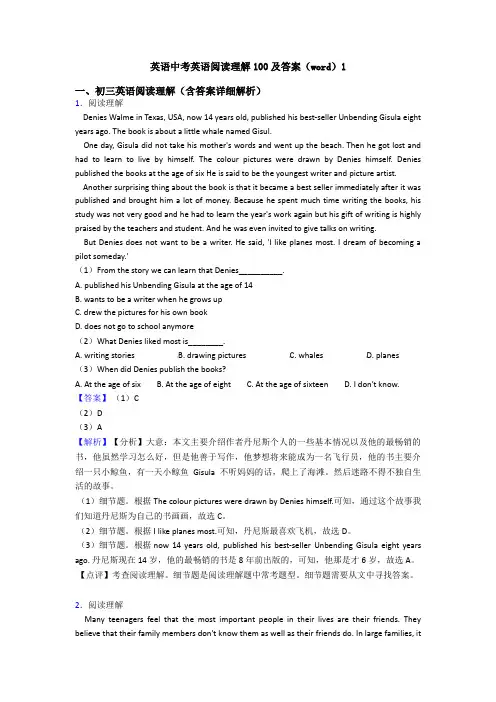
英语中考英语阅读理解100及答案(word)1一、初三英语阅读理解(含答案详细解析)1.阅读理解Denies Walme in Texas, USA, now 14 years old, published his best-seller Unbending Gisula eight years ago. The book is about a little whale named Gisul.One day, Gisula did not take his mother's words and went up the beach. Then he got lost and had to learn to live by himself. The colour pictures were drawn by Denies himself. Denies published the books at the age of six He is said to be the youngest writer and picture artist.Another surprising thing about the book is that it became a best seller immediately after it was published and brought him a lot of money. Because he spent much time writing the books, his study was not very good and he had to learn the year's work again but his gift of writing is highly praised by the teachers and student. And he was even invited to give talks on writing.But Denies does not want to be a writer. He said, 'I like planes most. I dream of becoming a pilot someday.'(1)From the story we can learn that Denies__________.A. published his Unbending Gisula at the age of 14B. wants to be a writer when he grows upC. drew the pictures for his own bookD. does not go to school anymore(2)What Denies liked most is________.A. writing storiesB. drawing picturesC. whalesD. planes (3)When did Denies publish the books?A. At the age of sixB. At the age of eightC. At the age of sixteenD. I don't know.【答案】(1)C(2)D(3)A【解析】【分析】大意:本文主要介绍作者丹尼斯个人的一些基本情况以及他的最畅销的书,他虽然学习怎么好,但是他善于写作,他梦想将来能成为一名飞行员,他的书主要介绍一只小鲸鱼,有一天小鲸鱼Gisula不听妈妈的话,爬上了海滩。
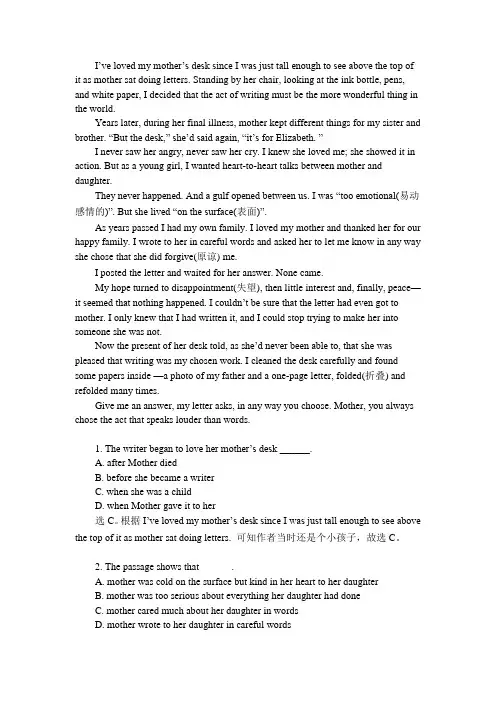
I’ve loved my mother’s desk since I was just tall enough to see above the top of it as mother sat doing letters. Standing by her chair, looking at the ink bottle, pens, and white paper, I decided that the act of writing must be the more wonderful thing in the world.Years later, during her final illness, mother kept different things for my sister and brother. “But the desk,” she’d said again, “it’s for Elizabeth. ”I never saw her angry, never saw her cry. I knew she loved me; she showed it in action. But as a young girl, I wanted heart-to-heart talks between mother and daughter.They never happened. And a gulf opened between us. I was “too emotional(易动感情的)”. But she lived “on the surface(表面)”.As years passed I had my own family. I loved my mother and thanked her for our happy family. I wrote to her in careful words and asked her to let me know in any way she chose that she did forgive(原谅) me.I posted the letter and waited for her answer. None came.My hope turned to disappointment(失望), then little interest and, finally, peace—it seemed that nothing happened. I couldn’t be sure that the letter had even got to mother. I only knew that I had written it, and I could stop trying to make her into someone she was not.Now the present of her desk told, as sh e’d never been able to, that she was pleased that writing was my chosen work. I cleaned the desk carefully and found some papers inside —a photo of my father and a one-page letter, folded(折叠) and refolded many times.Give me an answer, my letter asks, in any way you choose. Mother, you always chose the act that speaks louder than words.1. The writer began to love her mother’s desk ______.A. after Mother diedB. before she became a writerC. when she was a childD. when Mother gave it to her选C。
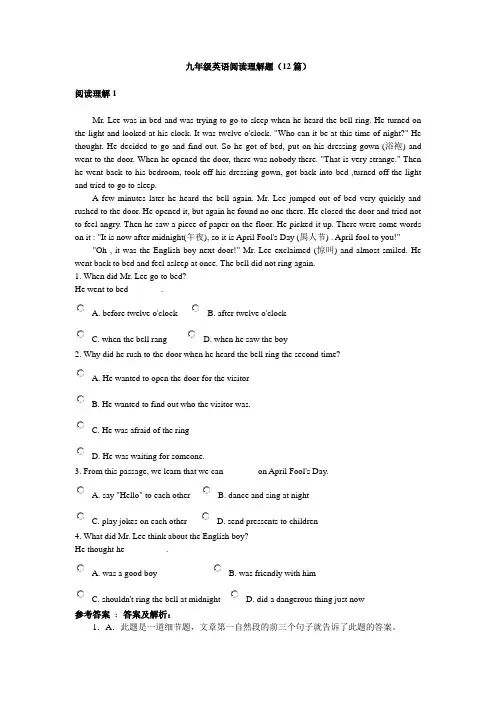
九年级英语阅读理解题(12篇)阅读理解1Mr. Lee was in bed and was trying to go to sleep when he heard the bell ring. He turned on the light and looked at his clock. It was twelve o'clock. "Who can it be at this time of night?" He thought. He decided to go and find out. So he got of bed, put on his dressing gown (浴袍) and went to the door. When he opened the door, there was nobody there. "That is very strange." Then he went back to his bedroom, took off his dressing gown, got back into bed ,turned off the light and tried to go to sleep.A few minutes later he heard the bell again. Mr. Lee jumped out of bed very quickly and rushed to the door. He opened it, but again he found no one there. He closed the door and tried not to feel angry. Then he saw a piece of paper on the floor. He picked it up. There were some words on it : "It is now after midnight(午夜), so it is April Fool's Day (禺人节) . April fool to you!""Oh , it was the English boy next door!" Mr. Lee exclaimed (惊叫) and almost smiled. He went back to bed and feel asleep at once. The bell did not ring again.1. When did Mr. Lee go to bed? He went to bed _______.A. before twelve o'clockB. after twelve o'clockC. when the bell rangD. when he saw the boy 2. Why did he rush to the door when he heard the bell ring the second time?A. He wanted to open the door for the visitorB. He wanted to find out who the visitor was.C. He was afraid of the ringD. He was waiting for someone. 3. From this passage, we learn that we can _______ on April Fool's Day.A. say "Hello" to each otherB. dance and sing at nightC. play jokes on each otherD. send pressents to children4. What did Mr. Lee think about the English boy? He thought he _________.A. was a good boyB. was friendly with himC. shouldn't ring the bell at midnightD. did a dangerous thing just now参考答案 :答案及解析:1.A .此题是一道细节题,文章第一自然段的前三个句子就告诉了此题的答案。
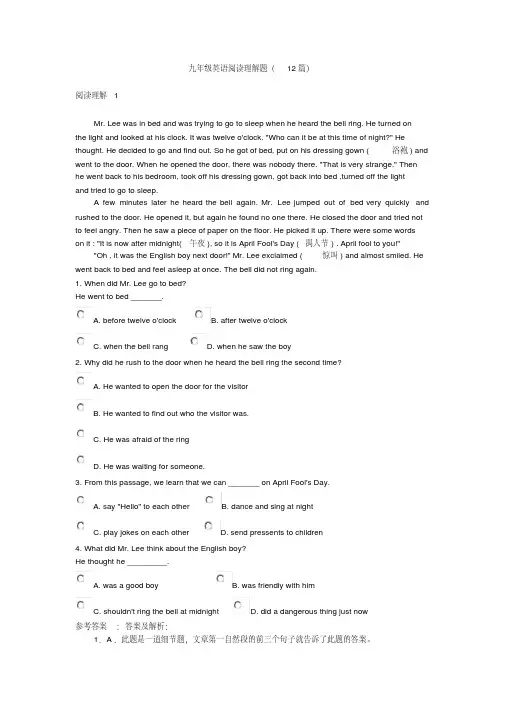
九年级英语阅读理解题(12篇)阅读理解 1Mr. Lee was in bed and was trying to go to sleep when he heard the bell ring. He turned onthe light and looked at his clock. It was twelve o'clock. "Who can it be at this time of night?" He thought. He decided to go and find out. So he got of bed, put on his dressing gown (浴袍) and went to the door. When he opened the door, there was nobody there. "That is very strange." Thenhe went back to his bedroom, took off his dressing gown, got back into bed ,turned off the lightand tried to go to sleep.A few minutes later he heard the bell again. Mr. Lee jumped out of bed very quickly and rushed to the door. He opened it, but again he found no one there. He closed the door and tried not to feel angry. Then he saw a piece of paper on the floor. He picked it up. There were some wordson it : "It is now after midnight(午夜), so it is April Fool's Day (禺人节) . April fool to you!""Oh , it was the English boy next door!" Mr. Lee exclaimed (惊叫) and almost smiled. He went back to bed and feel asleep at once. The bell did not ring again.1. When did Mr. Lee go to bed?He went to bed _______.A. before twelve o'clockB. after twelve o'clockC. when the bell rangD. when he saw the boy2. Why did he rush to the door when he heard the bell ring the second time?A. He wanted to open the door for the visitorB. He wanted to find out who the visitor was.C. He was afraid of the ringD. He was waiting for someone.3. From this passage, we learn that we can _______ on April Fool's Day.A. say "Hello" to each otherB. dance and sing at nightC. play jokes on each otherD. send pressents to children4. What did Mr. Lee think about the English boy?He thought he _________.A. was a good boyB. was friendly with himC. shouldn't ring the bell at midnightD. did a dangerous thing just now参考答案:答案及解析:1.A.此题是一道细节题,文章第一自然段的前三个句子就告诉了此题的答案。
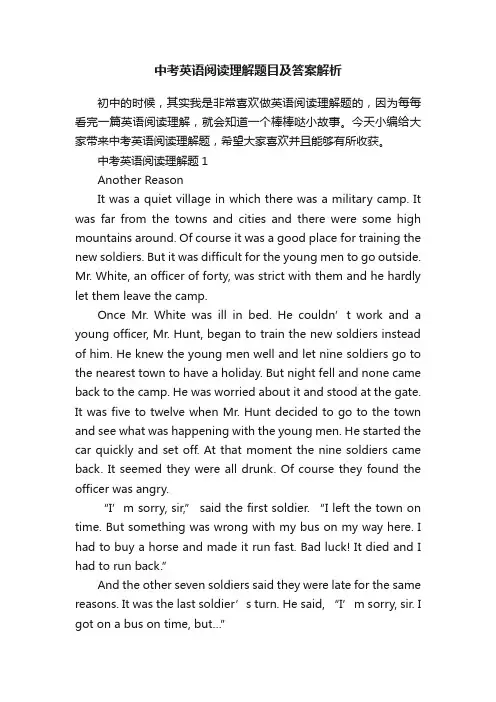
中考英语阅读理解题目及答案解析初中的时候,其实我是非常喜欢做英语阅读理解题的,因为每每看完一篇英语阅读理解,就会知道一个棒棒哒小故事。
今天小编给大家带来中考英语阅读理解题,希望大家喜欢并且能够有所收获。
中考英语阅读理解题1Another ReasonIt was a quiet village in which there was a military camp. It was far from the towns and cities and there were some high mountains around. Of course it was a good place for training the new soldiers. But it was difficult for the young men to go outside. Mr. White, an officer of forty, was strict with them and he hardly let them leave the camp.Once Mr. White was ill in bed. He couldn’t work and a young officer, Mr. Hunt, began to train the new soldiers instead of him. He knew the young men well and let nine soldiers go to the nearest town to have a holiday. But night fell and none came back to the camp. He was worried about it and stood at the gate. It was five to twelve when Mr. Hunt decided to go to the town and see what was happening with the young men. He started the car quickly and set off. At that moment the nine soldiers came back. It seemed they were all drunk. Of course they found the officer was angry.“I’m sorry, sir,” said the first soldier. “I left the town on time. But something was wrong with my bus on my way here. I had to buy a horse and made it run fast. Bad luck! It died and I had to run back.”And the other seven soldiers said they were late for the same reasons. It was the last soldier’s turn. He said, “I’m sorry, sir. I got on a bus on ti me, but…”Having heard this, the officer became even angrier and stopped him at once. He called out, “If you say something was wrong with your bus, I’ll punish you at once!”“No, no, sir,” said the young man. “My bus was all right, but the dead horses were in its way!”1. The military camp was built in the village to _______.A. stop the soldiers going to townsB. stop the soldiers meeting their friendsC. train the new soldiersD. make the young men live quietly2. Mr. Hunt let the nine soldiers have a holiday because _______.A. he was kind to themB. they felt lonelyC. they had something important to doD. they were the best of all3. The young officer was worried because _______.A. a traffic accident had happenedB. he was afraid something happened to the nine soldiersC. the nine soldiers didn’t come back on timeD. the nine soldiers drank too much in the town4. The nine soldiers returned to the camp late because _______.A. something was wrong with their busesB. their horses died on the return wayC. it took them much time to run backD. they all had drunk much in the town5. Which answer do you think right?A. I’ll believe only the last soldier.B. The officer believed the nine soldiers.C. I’ll believe none of the nine soldiers.D. The officer won’t punish his soldiers.【答案与解析】本文讲9个士兵为自己没有按时返回军营找借口开脱的故事。
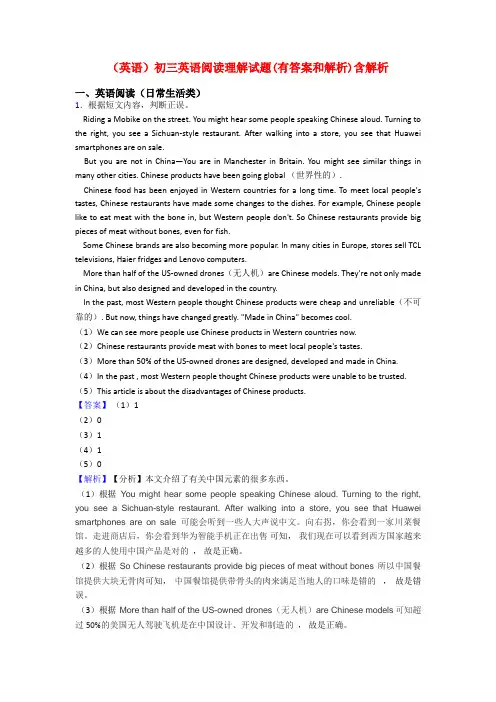
(英语)初三英语阅读理解试题(有答案和解析)含解析一、英语阅读(日常生活类)1.根据短文内容,判断正误。
Riding a Mobike on the street. You might hear some people speaking Chinese aloud. Turning to the right, you see a Sichuan-style restaurant. After walking into a store, you see that Huawei smartphones are on sale.But you are not in China—You are in Manchester in Britain. You might see similar things in many other cities. Chinese products have been going global (世界性的).Chinese food has been enjoyed in Western countries for a long time. To meet local people's tastes, Chinese restaurants have made some changes to the dishes. For example, Chinese people like to eat meat with the bone in, but Western people don't. So Chinese restaurants provide big pieces of meat without bones, even for fish.Some Chinese brands are also becoming more popular. In many cities in Europe, stores sell TCL televisions, Haier fridges and Lenovo computers.More than half of the US-owned drones(无人机)are Chinese models. They're not only made in China, but also designed and developed in the country.In the past, most Western people thought Chinese products were cheap and unreliable(不可靠的). But now, things have changed greatly. "Made in China" becomes cool.(1)We can see more people use Chinese products in Western countries now.(2)Chinese restaurants provide meat with bones to meet local people's tastes.(3)More than 50% of the US-owned drones are designed, developed and made in China. (4)In the past , most Western people thought Chinese products were unable to be trusted. (5)This article is about the disadvantages of Chinese products.【答案】(1)1(2)0(3)1(4)1(5)0【解析】【分析】本文介绍了有关中国元素的很多东西。
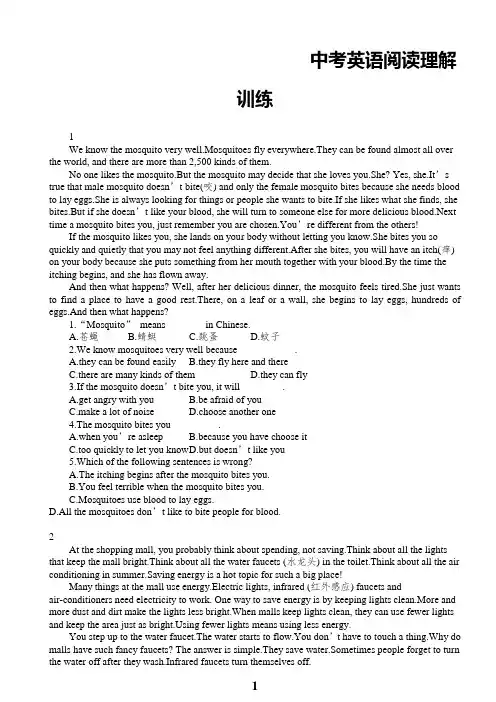
中考英语阅读理解训练1We know the mosquito very well.Mosquitoes fly everywhere.They can be found almost all over the world, and there are more than 2,500 kinds of them.No one likes the mosquito.But the mosquito may decide that she loves you.She? Yes, she.It’s true that male mosquito doesn’t bite(咬) and only the female mosquito bites because she needs blood to lay eggs.She is always looking for things or people she wants to bite.If she likes what she finds, she bites.But if she doesn’t like your blood, she will turn to someone else for more delicious blood.Next time a mosquito bites you, just remember you are chosen.You’re different from the others!If the mosquito likes you, she lands on your body without letting you know.She bites you so quickly and quietly that you may not feel anything different.After she bites, you will have an itch(痒) on your body because she puts something from her mouth together with your blood.By the time the itching begins, and she has flown away.And then what happens? Well, after her delicious dinner, the mosquito feels tired.She just wants to find a place to have a good rest.There, on a leaf or a wall, she begins to lay eggs, hundreds of eggs.And then what happens?1.“Mosquito”means _______ in Chinese.A.苍蝇B.蜻蜓C.跳蚤D.蚊子2.We know mosquitoes very well because ___________.A.they can be found easilyB.they fly here and thereC.there are many kinds of themD.they can fly3.If the mosquito doesn’t bite you, it will ________.A.get angry with youB.be afraid of youC.make a lot of noiseD.choose another one4.The mosquito bites you _________.A.when you’re asleepB.because you have choose itC.too quickly to let you knowD.but doesn’t like you5.Which of the following sentences is wrong?A.The itching begins after the mosquito bites you.B.You feel terrible when the mosquito bites you.C.Mosquitoes use blood to lay eggs.D.All the mosquitoes don’t like to bite people for blood.2At the shopping mall, you probably think about spending, not saving.Think about all the lights that keep the mall bright.Think about all the water faucets (水龙头) in the toilet.Think about all the air conditioning in summer.Saving energy is a hot topic for such a big place!Many things at the mall use energy.Electric lights, infrared (红外感应) faucets andair-conditioners need electricity to work. One way to save energy is by keeping lights clean.More and more dust and dirt make the lights less bright.When malls keep lights clean, they can use fewer lights and keep the area just as ing fewer lights means using less energy.You step up to the water faucet.The water starts to flow.You don’t have to touch a thing.Why do malls have such fancy faucets? The answer is simple.They save water.Sometimes people forget to turn the water off after they wash.Infrared faucets turn themselves off.1._____ is a hot topic for a big mall.A. To spend moneyB. To Save energyC. To keep the mall brightD. To buy things2. What will the fourth paragraph probably talk about?A. How to save water when using infrared faucets irl the mall.B. How to save energy when using air—conditioners in the mail.C. How to save money When shopping in the mail.3. The best title for the passage is _______.A. Lights, faucets and air—conditionersB.Spending less moneyC.Energy saving at the mall D.A hot topic3I’ve loved my mother’s desk since I was just tall enough to see above the top of it as mother sat doing letters.Standing by her chair, looking at the ink bottle, pens, and white paper, I decided that the act of writing must be the more wonderful thing in the world.Years later, during her final illness, mother kept different things for my sister and brother.“But the desk,”she’d said again, “it’s for Elizabeth.”I never saw her angry, never saw her cry.I knew she loved me; she showed it in action.But as a young girl, I wanted heart-to-heart talks between mother and daughter.They never happened.And a gulf opened between us.I was “too emotional(易动感情的)”.But she lived “on the surface(表面)”.As years passed I had my own family.I loved my mother and thanked her for our happy family.I wrote to her in careful words and asked her to let me know in any way she chose that she didforgive(原谅) me.I posted the letter and waited for her answer.None came.My hope turned to disappointment(失望), then little interest and, finally, peace—it seemed that nothing happened.I couldn’t be sure that the letter had even got to mother.I only knew that I had written it, and I could stop trying to make her into someone she was not.Now the present of her desk told, as she’d never been able to, that she was pleased that writing was my chosen work.I cleaned the desk carefully and found some papers inside —a photo of my father and a one-page letter, folded(折叠) and refolded many times.Give me an answer, my letter asks, in any way you choose.Mother, you always chose the act that speaks louder than words.1.The writer began to love her mother’s desk ______.A.after Mother diedB.before she became a writerC.when she was a childD.when Mother gave it to her2.The passage shows that ______.A.mother was cold on the surface but kind in her heart to her daughterB.mother was too serious about everything her daughter had doneC.mother cared much about her daughter in wordsD.mother wrote to her daughter in careful words3.The word “gulf”in the passage means ______.A.deep understanding between the old and the youngB.different ideas between the mother and the daughterC.free talks between mother and daughterD.part of the sea going far in land4.What did mother do with her daughter’s letter asking forgiveness?A.She had never received the letter.B.For years, she often talked about the letter.C.She didn’t forgive her daughter at all in all her life.D.She read the letter again and again till she died.5.What’s the best title of the passage?A.My letter to MotherB.Mother and ChildrenC.My mother’s DeskD.Talks between Mother and Me4Here are some tips (建议) on how to stay safe in earthquakes (地震).1. Stay inside and duck and cover.Get under a desk or table, or stand in a corner or under a doorway.Cover your head and neck with your arms.2.Move against a wall if in a high building with no protective desk or table nearby.Cover your head and neck with your arms.3. Try to get into an open area away from trees, buildings, walls, and power lines (电杆) if outdoors。
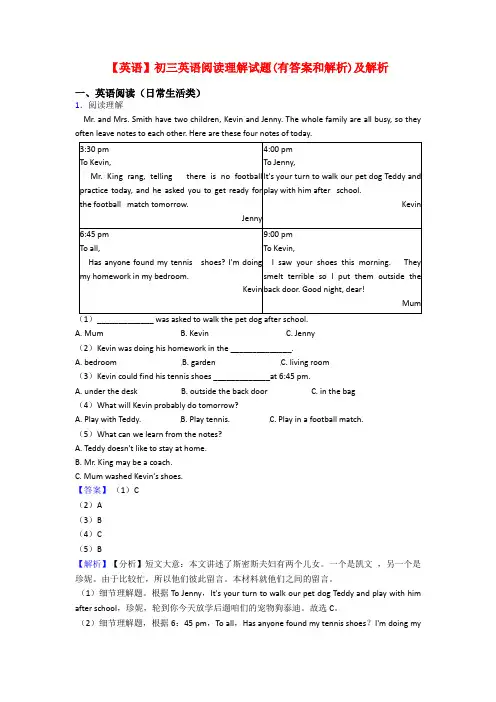
【英语】初三英语阅读理解试题(有答案和解析)及解析一、英语阅读(日常生活类)1.阅读理解Mr. and Mrs. Smith have two children, Kevin and Jenny. The whole family are all busy, so they often leave notes to each other. Here are these four notes of today.3:30 pmTo Kevin, Mr. King rang, telling there is no football practice today, and he asked you to get ready for the football match tomorrow.Jenny4:00 pm To Jenny,It's your turn to walk our pet dog Teddy and play with him after school.Kevin 6:45 pmTo all,Has anyone found my tennis shoes? I'm doing my homework in my bedroom. Kevin 9:00 pm To Kevin, I saw your shoes this morning. They smelt terrible so I put them outside theback door. Good night, dear!MumA. MumB. KevinC. Jenny(2)Kevin was doing his homework in the ______________.A. bedroomB. gardenC. living room(3)Kevin could find his tennis shoes _____________at 6:45 pm.A. under the deskB. outside the back doorC. in the bag(4)What will Kevin probably do tomorrow?A. Play with Teddy.B. Play tennis.C. Play in a football match.(5)What can we learn from the notes?A. Teddy doesn't like to stay at home.B. Mr. King may be a coach.C. Mum washed Kevin's shoes.【答案】 (1)C(2)A(3)B(4)C(5)B【解析】【分析】短文大意:本文讲述了斯密斯夫妇有两个儿女。
【英语】中考英语阅读理解题20套(带答案)含解析一、阅读理解1.根据短文内容选择正确答案。
B“Do you believe in life after death?” Jack's boss asked Jack.“Yes, Sir.”“Well, then, that makes everything just fine,” the boss went on. “About an hour after you left yesterday to go to your grandfather's funeral(葬礼), he dropped in to see you.”(1)What do you think Jack did the day before?A. He attended his grandfather's funeral.B. He did nothing special and he worked as usual.C. He meant to attend a funeral but didn't.D. He told a lie to get the day off.(2)What do you guess Jack's grandfather was doing the day before?A. He had been dead for some days but suddenly came to life again.B. He was thought to be dead but in fact well and alive.C. He was doing his usual business.D. He learned that Jack had cheated his boss and came to see him.(3)When the boss said, "That makes everything just fine", he _______.A. meant he was glad that Jack’s grandfather was still aliveB. was, in fact, telling Jack that he had been found outC. was, in fact, telling Jack that everything was OKD. meant he was glad that Jack believed in life after death【答案】(1)D(2)C(3)B【解析】【分析】这是一个笑话,Jack借口参加祖父的葬礼而请假刚离开不久,他的祖父来看他。
(英语)中考英语阅读理解题 20 套( 带答案 ) 含解析一、阅读理解1.阅读理解Scrapbooking is a hobby. It was popular for more than 500 years. People called it a friendship book. They kept pictures, letters, poems and other things they wanted to remember.Today people collect many things in scrapbooks. Some people have funny collections, likethe world's most awkward ideas or pictures of the world's most ugly dogs. Other people maycollect stories about the bad weather.It is easy to get started. First, you should decide what you want to collect. Start with just one idea. Next, you will need a book with background paper, scissors and glue. You need the scissors to cut out the pictures or stories. You need the glue to stick them to the background paper.You can be busy and collect many things or lazy and collect few things. It'll be lots of funto make your scrapbook and you can share it with your friends.(1) How long was scrapbooking popular?A. less than 500 yearsB. 500 yearsC. over 500 yearsD. more than 550 years (2) What is the Chinese meaning of the underlined word "awkward"?A. 聪慧的B. 蠢笨的C. 美好的D. 残疾的(3) How many items (物件) are mentioned to make a scrapbook?A. One.B. Two.C. Three.D. Four.(4) To make a scrapbook, what do you need first?D. An idea.A. Glue.B. Scissors.C. A book.(5) What's the best title of the passage?A. ScrapbookingB. The History of ScrapbookingC. What Is a Scrapbook?D. How to make a Scrapbook【答案】( 1) C(2) B(3) C(4) D(5) A【解析】【解析】本文介绍了剪粘书的通途,可以保存照片、信件、诗歌和其余他们想记着的东西。
中考英语阅读理解练习及答案解析中考英语阅读理解练习及答案解析解主旨大意这种题目时,不能只凭文中的只言片语而断章取义,要在细读全文的基础上,结合所学语言知识、背景知识、生活常识、科学专业知识进行逻辑思维、推理、判断,从而获取文章中内隐的信息。
下面是店铺分享的中考英语阅读理解,希望能对大家有所帮助! 英语阅读理解【1】Teahouses in ChengduThere is a saying, “China has the best teahouses in the world and Chengdu has the best teahouses in China.”Chengdu has not only many teahouses but also the special ways of serving and drinking tea.As soon as the visitors enter the teahouses, the waiters or waitresses will greet them with teapots and cups in their hands. The cups often have special covers and saucers(茶碟). The covers can keep the water warm.People who go to the teahouses are not all thirsty. Retired(退休)people pay a little money to the teahouses and then sit there all day long to chat with others. Sometimes, people have parties in the teahouses. They eat fruit and sunflower seeds(瓜子)while they chat and return home when they are tired. Teahouses are also good places for people to talk about businesses. Some of the teahouses even have stages for performances, such as storytelling, cross talk and Sichuan Opera. Sometimes when people have a quarrel, a mediator(调解员)will bring them to the teahouse. After their problem is solved, the person who is wrong will pay for the tea. It is interesting that as soon as the quarrelers enter the teahouse and sit down to drink tea, they have almost calmed down. With the help of the mediator, their problems canbe easily solved then. Maybe we can say the teahouses have some special social functions.31.Chengdu has the best teahouses in China because _____.A.the serving of the teahouses in Chengdu is very specialB.there are many people in Chengdu teahousesC.there are many old men in Chengdu teahousesD.the cups in Chengdu teahouses are old32.People in Chengdu’s teahouses may _____ while they are drinking according to the passage.A.enjoy interesting storiesB.watch moviesC.listen to Beijing OperaD.quarrel in loud voice33.Who will pay for the tea after the mediator solve some problems?A.The mediator himselfB.The person who caused the problemC.All the persons in the teahouseD.The owner of the teahouse34.This passage is taken from some newspaper. Which part do you think it is from?A.The sports part.B.The news part.C.The culture part.D.The education part.35.This passage mainly talks about _______.A.how to make teaB.how to open a teahouseC.the special functions of the teahousesD.the special way of enjoying tea英语阅读理解【2】In 1826, a Frenchman named Niepce needed pictures for his business .But he was not a good artist. So he invented a very simple camera. He put it in a window of his house and took a picture of his garden. That was the first photo.The next important date in the history of photography (摄影术) was in 1837. That year, Daguerre, another Frenchman, took a picture of his reading room. He used a new kind of camera in a different way. In his picture you could see everything very clearly, even the smallest thing. This kind of photo was called a Daguerreotype.Soon, other people began to use Daguerre’s way. Travelers brought back wonderful photos from all around the world. People took pictures of famous buildings, cities and mountains.In about 1840, photography was developed. Then photographers could take pictures of people and moving things. That was not simple. The photographers had to carry a lot of films and other machines. But this did not stop them, for example, some in the United States worked so hard.Mathew Brady was a famous American photographers. He took many pictures of great people. The picture were unusual because they were very lifelike(栩栩如生的).Photographers also became one kind of art by the end of the 19th century. Some photos were not just copies of the real world. They showed the ideas and feelings, like other kinds of art.36.The first photo taken by Niepce was a picture of ____________A. his businessB. his gardenC. his window37.The Daguerreotype was____________.A. a FrenchmanB. a kind of pictureC. a kind of camera38.If a photographer wanted to take pictures of moving things in the year of 1840, he had to__________.A. watch lots of filmsB. buy an expensive cameraC. take many films and something else with him.39.Mathew Brady______________.A. was very lifelikeB. was quite strongC. was famous for his unusual pictures40.This passage tells us_____________.A. how photography was developedB. how to show your ideas and feelings in picturesC. how to take pictures in the world英语阅读理解【3】Beijing is facing severe (严重的) traffic problems."Roads are wider now, but traffic jams (堵塞) often happen every day. " Yuan, a Beijing taxi drivers said.Beijing government is trying to do something to make traffic jams less. Before 2007, there were a few subway lines in Beijing. There was only line 1, line 2, line 13 and Batong Line. But now there is line 5, line 10, line 4, the airport fast -track and the Olympic branch line. And there will be 13 subway lines under construction in Beijing at the same time at the end of this year.The opening of the new subway line is convenient to tourists. Before, arriving in Beijing, many visitors would usually take a taxi to interesting places of Beijing. Today, as soon as people get off the plane, they can take the Airport Express Line, going to different interesting places through the subway lines. The government also strives to open a new line each year from now until 2015. The subway of Beijing reached 300 kilometers in 2010 and it will reach 561 kilometers in 2015.Miss Xiao, who lives in South Water Bridge and works at Hepingli, said that traveling by her car still took her at least one hour from home to work because of traffic jams. Now, because of the railway line 5, Miss Xiao can arrive at her office in less than haft an hour.【小题1】What are the traffic problems in Beijing now?A. Drivers drive too fast.B. Roads are not wide enough.C. Traffic jams often happen.D. Traffic lights are always broken.【小题2】What does the underlined phrase "under construction" mean in Chinese?A. 在学习B. 在建造中C. 在应用中D. 在控制中【小题3】Why is the opening of the new subway line convenient to tourists?A. Because the new subway line is very interesting.B. Because the new subway line's ticket is very cheap.C. Because people in Beijing can cost less money than that before.D. Because visitors can take the subway to many different interesting places.【小题4】Which of the following is TRUE according to the passage?A. Visitors like to take a taxi in Beijing better.B. The subway of Beijing will reach 300 kilometers in 2015.C. There will be 15 subway lines in Beijing at the end of the year.D. It takes Miss Xiao less time to get to her workplace by railway line 5.【小题5】What is the main idea of the passage?A. People in Beijing invented high -speed trains.B. Railway lines in Beijing only covers some areas.C. Beijing welcomes visitors from different places.D. Beijing government has done something to make traffic jams less.。
中考时文阅读练习01中考时文阅读练习---有了这个AI,“吵架”想输都难!阅读理解主题语境:发明与技术语篇类型:说明文词数:261难度:★★★☆☆建议用时:8分钟正确率:____ /4Have you ever shouted at your computer because it wasn't working? Of course,your computercan't“shout” back. But AI researchers have been working on computers that can argue and perhaps even win debates(辩论) with humans.IBM scientists recently published a paper in Nature about their new AI system—Project Debater.It can debate with people in front of a live audience(观众).After listening to arguments from its opponent(对手),the system can search around 400 million online articles in less than five minutes. And then it looks for ideas that can support its own argument.Testing on the system began in 2019. when it debated with Harish Natarajan. a prof essional debater who holds the world record for the most debate competition victories.The topic was aboutsubsidizing preschool(资助幼儿园)—and Project Debater argued to support this idea. Although Project Debater lost the debate in the end.the audience said it performed very well. Interestingly,58 percent of the audience said that Project Debater increased their knowledge about the topic—only 20 percent said the same about Natarajan.According to Scientific American, results show that the system is able to form logical statements(有逻辑的陈述).However,winning a debate is never the researchers' goal. Their goal is to help humans make better decisions according to Ranit Aharanoy manager of the Project Debater team.“It can debate both sides, so it can very quickly help you understand both sides of the problem,thus you can have a wider view of the problem and make a more thoughtful(深思熟虑的)decision."Aharanoy said.1.How does Project Debater work?① It forms ideas that can support its own argument.② It listens to its opponent's arguments.③ It searches online articles.④ It debates with its opponent.A.①②③④B.②③①④C.③②①④D.④②①③2. In the debate with Harish Natarajan,Project Debater____.A.argued to support subsidizing preschoolB. won the debate in the endC. set a world debating recordD. often argued against itself3. What did the audience think of the debate between Natarajan and Project Debater?A.One-fifth thought Project Debater wouldn't win the debate.B. More didn't believe Project Debater for its some disadvantages.C. More than half said Project Debater increased their knowledge.D. 58 percent thought Natarajan performed better than Project Debater.4.With Project Debater, we might____.A. make better decisions after better understanding problemsB. never make mistakes when dealing with problemsC. always have better arguments in any debateD. learn how to form logical statements in a debate译文你是否曾经因你的电脑不工作而对它大喊大叫?当然,你的电脑不能反过来对你“大喊大叫”。
Jean is a bright young woman who comes from a rich and famous family. She goes to a good university and has everything that money can buy. Well, almost everything. The problem is that the people in Jean’s family are so busy that they can hardly find time to be with her. In fact, Jean is quite lonely.So Jean spends a lot of time on her QQ. She likes being anonymous(匿名), talking to people who do not know about her famous family and her rich life. She uses the name Linda on QQ and has made a lot of friends who she keeps in touch with quite often.Last year Jean made a very special friend on QQ. His name was David and lived in San Francisco. David was full of stories and jokes. He and Jean had a common(共同的) interest in rock music and modern dance. So it always took them hours to talk happily on QQ and sometimes they even forgot their time. Of course, they wanted to know more about each other. David sent a picture of himself: He was a tall,good-looking young man with a big, happy smile. As time went by, they became good friends and often sent cards and small things to each other.When Jean’s father told her that he was going on a business trip to San Francisco, she asked him to let her go with him so that she could give David a surprise for his birthday. She would take him the latest DVD of their favorite rock singer. But when she knocked on David’s door in San Francisco, she found that her special friend was a twelve-year-old boy named Jim!1. Jean spends a lot of her time on QQ because she is _______.A. richB. famousC. youngD. lonely选D。
中考英语阅读理解及解析(9篇)中考英语阅读理解及解析篇1When you want to go shopping, decide how much money you can spend for new clothes. Think about the kind of clothes you really need. Then look for those clothes on sale(销售).There are labels(标签)inside all new clothes. The labels tell you how to take care of your clothes. The label for a shirt may tell you to wash it in warm water. A sweater label may tell you to wash by washing in cold water. The label on a coat may say "dry clean only." Washing may ruin(损坏)this coat. If you do as the directions(说明)say on the label, you can keep your clothes looking their best. Many clothes today must be dry cleaned. Dry cleaning is expensive. When buying new clothes, check(核实)to see if they will need to be dry cleaned. You will save money if you buy clothes that can be washed.You can save money if you buy clothes that are well made. Well-made clothes last longer. They look good even after they have been washed many times. Clothes that cost more money are not always better made. They do not always fit(合身)better. Sometime less expensive clothes look and fit better than more expensive clothes.1.If you want to save money you can buy clothes that _____.A. don’t fit youB. don’t last longC. need to be dry cleanedD. can be washed2.The label inside the clothes tell you______.A. how to keep them looking their bestB. how to save moneyC. whether they fit you or notD. where to get them dry cleaned3.The first thing for you to do before you buy clothes is ______.A. to look for well-made clothesB. to see how much money you can payC. to know how to wash themD. to read the labels inside them4.We learn from the reading that cheaper clothes ______.A. are always worse madeB. must be dry cleanedC. can not be washedD. can sometimes fit you better5.The best title(标题) for the reading should be______.A. Buying Less Expensive ClothesB. Taking Enough Money When ShoppingC. Being a Clever Clothes ShopperD. Choosing the Labels inside New Clothes【答案与解析】1.此题为理解题,从第二段Dry cleaning is expensive. You will save money if you buy clothes that can be washed.可以看出C答案不对,又可以从第三段很容易判断出A和B不对。
中考英语阅读理解训练1We know the mosquito very well. Mosquitoes fly everywhere. They can be found almost all over the world, and there are more than 2,500 kinds of them.No one likes the mosquito. But the mosquito may decide that she lo ves you. She? Yes, she. It’s true that male mosquito doesn’t bite(咬) and only the female mosquito bites because she needs blood to lay eggs. She is always looking for things or people she wants to bite. If she likes what she finds, she bites. But if she do esn’t like your blood, she will turn to someone else for more delicious blood. Next time a mosquito bites you, just remember you are chosen. You’re different from the others!If the mosquito likes you, she lands on your body without letting you know. She bites you so quickly and quietly that you may not feel anything different. After she bites, you will have an itch(痒) on your body because she puts something from her mouth together with your blood. By the time the itching begins, and she has flown away.And then what happens? Well, after her delicious dinner, the mosquito feels tired. She just wants to find a place to have a good rest. There, on a leaf or a wall, she begins to lay eggs, hundreds of eggs. And then what happens?1. “Mosquito” means _______ in Chinese.A. 苍蝇B. 蜻蜓C. 跳蚤D. 蚊子2. We know mosquitoes very well because ___________.A. they can be found easilyB. they fly here and thereC. there are many kinds of themD. they can fly3. If the mosquito doesn’t bite you, it will ________.A. get angry with youB. be afraid of youC. make a lot of noiseD. choose another one4. The mosquito bites you _________.A. when you’re asleepB. because you have choose itC. too quickly to let you knowD. but doesn’t like you5. Which of the following sentences is wrong?A. The itching begins after the mosquito bites you.B. You feel terrible when the mosquito bites you.C. Mosquitoes use blood to lay eggs.D. All the mosquitoes don’t like to bite people for blood.2At the shopping mall, you probably think about spending, not saving. Think about all the lights that keep the mall bright. Think about all the water faucets (水龙头) in the toilet. Think about all the air conditioning in summer. Saving energy is a hot topic for such a big place!Many things at the mall use energy. Electric lights, infrared (红外感应) faucets andair-conditioners need electricity to work.One way to save energy is by keeping lights clean. More and more dust and dirt make the lights less bright. When malls keep lights clean, they can use fewer lights and keep the area just as bright. Using fewer lights means using less energy.You step up to the water faucet. The water starts to flow. You don’t have to touch a thing. Why do malls have such fancy faucets? The answer is simple. They save water. Sometimes people forget to turn the water off after they wash. Infrared faucets turn themselves off.1. _____ is a hot topic for a big mall.A.To spend money B.To Save energyC.To keep the mall bright D.To buy things2.What will the fourth paragraph probably talk about?A.How to save water when using infrared faucets irl the mall.B. How to save energy when using air—conditioners in the mail.C.How to save money When shopping in the mail.3.The best title for the passage is _______.A.Lights, faucets and air—conditioners B. Spending less moneyC.Energy saving at the mall D. A hot topic3I’ve loved my mother’s desk since I was just tall enough to see above the top of it as mother sat doing letters. Standing by her chair, looking at the ink bottle, pens, and white paper, I decided that the act of writing must be the more wonderful thing in the world.Years later, during her final illness, mother kept different things for my sister and brother. “But the desk,” she’d said again, “it’s for Elizabeth. ”I never saw her angry, never saw her cry. I knew she loved me; she showed it in action. But as a young girl, I wanted heart-to-heart talks between mother and daughter.They never happened. And a gulf opened between us. I was “too emotional(易动感情的)”. But she lived “on the surface(表面)”.As years passed I had my own family. I loved my mother and thanked her for our happy family. I wrote to her in careful words and asked her to let me know in any way she chose that she didforgive(原谅) me.I posted the letter and waited for her answer. None came.My hope turned to disappointment(失望), then little interest and, finally, peace— it seemed that nothing happened. I couldn’t be sure that the letter had even got to mother. I only knew that I had written it, and I could stop trying to make her into someone she was not.Now the present of her desk told, as she’d never been able to, that she was pleased that writing was my chosen work. I cleaned the desk carefully and found some papers inside —a photo of my father and a one-page letter, folded(折叠) and refolded many times.Give me an answer, my letter asks, in any way you choose. Mother, you always chose the act that speaks louder than words.1. The writer began to love her mother’s desk ______.A. after Mother diedB. before she became a writerC. when she was a childD. when Mother gave it to her2. The passage shows that ______.A. mother was cold on the surface but kind in her heart to her daughterB. mother was too serious about everything her daughter had doneC. mother cared much about her daughter in wordsD. mother wrote to her daughter in careful words3. The word “gulf” in the passage means ______.A. deep understanding between the old and the youngB. different ideas between the mother and the daughterC. free talks between mother and daughterD. part of the sea going far in land4. What did mother do with her daughter’s letter asking forgiveness?A. She had never received the letter.B. For years, she often talked about the letter.C. She didn’t forgive her daughter at all in all her life.D. She read the letter again and again till she died.5. What’s the best title of the passage?A. My letter to MotherB. Mother and ChildrenC. My mother’s DeskD. Talks between Mother and Me4Here are some tips (建议) on how to stay safe in earthquakes (地震).1.Stay inside and duck and cover. Get under a desk or table, or stand in a corner or under a doorway. Cover your head and neck with your arms.2.Move against a wall if in a high building with no protective desk or table nearby. Cover your head and neck with your arms.3.Try to get into an open area away from trees, buildings, walls, and power lines (电杆) if outdoors。